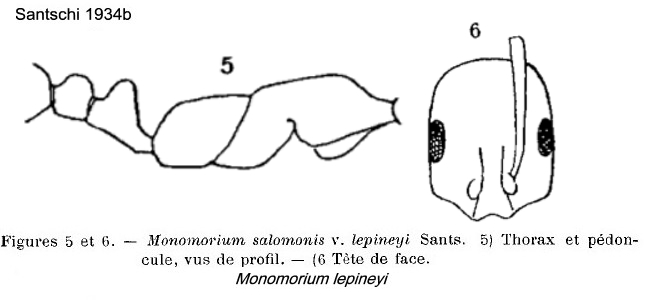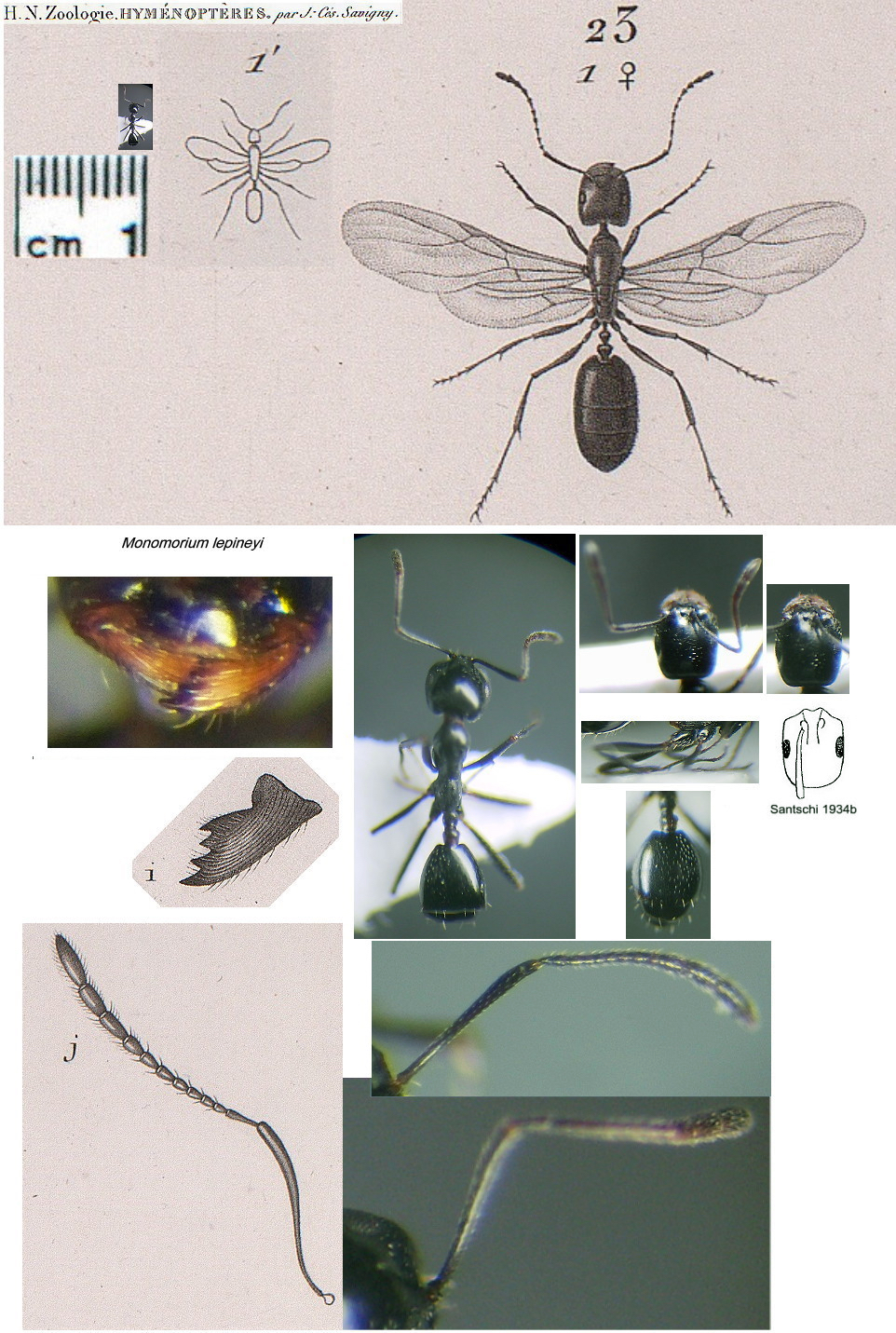Monomorium lepineyi (Santschi) - new status
  Type location Mauritania
(Monomorium (Xeromyrmex) salomonis L. var lepineyi n.
var., Santschi, 1934b: 84, illustrated, worker) note from "French
Sudan"[wrongly thought by Bolton to be Sudan], Nema, collector J. De
Lépiney, 1933-34; worker only described Type location Mauritania
(Monomorium (Xeromyrmex) salomonis L. var lepineyi n.
var., Santschi, 1934b: 84, illustrated, worker) note from "French
Sudan"[wrongly thought by Bolton to be Sudan], Nema, collector J. De
Lépiney, 1933-34; worker only described  . .
Raised by us to species status from a junior synonym
of Monomorium
areniphilum (Santschi) following examination of specimens from
Egypt.
|
 Santschi's (1934b)
description is at Santschi's (1934b)
description is at  . Bolton's modern note
(1987: 336) is at . Bolton's modern note
(1987: 336) is at  . .
In translation, the Santschi (1934b) description reads -
WORKERS - TL 3 mm; black, the alitrunk slightly reddish; mandibles,
femora, genae, tarsi and peduncle of the petiole reddish; antenna and
rest of the legs medium brown. Finely reticulo-punctate, near matt;
gaster smooth and shiny with an effaced puncturation. Erect pilosity
rare, absent on the alitrunk, very fine on and under the head.
Pubescence very short, spaced on the appendages and gaster. Head about
one-quarter longer than wide, the sides slightly convergent behind the
eyes. The scape surpasses the occiptal border by about one fifth of its
length; Second segment of the funiculus not notably longer than the
third. Alitrunk more slender than Monomorium
pullulum (Santschi); the propodeum more elongated, with the
dorsum about twice as long as the declivity, which is more abrupt than
in pullulum, the angle rounded. Metanotal groove slightly deep
in profile. Postpetiole a fifth wider than the petiole. Generally
smaller than pullulum, the head and dorsum of the propodeum
longer. From Nema, 5 workers; collector de Lépiney.
The synonymy in Bolton (1987) was noted as "provisional"
with the comment - "The single lepineyi specimen available for
study matches areniphilum moderately well, but it is smaller
and darker in colour, being a uniform blackish-brown, and has the head
narrower than the areniphilum syntypes. The eyes in the lepineyi
syntype are slightly larger than in areniphilum and the sides
of the head are not as distinctly convergent posteriorly"
Clearly a north African Sahel savannah species, as the
known findings are from Mauritania and Egypt.
Egypt records Sharaf list- notes examined "Monomorium
lepineyi" - Abu-Madi, Zaranik (North Sinai), 6.v.2003 (5) (SHC).
|
 Queen - this montage compares the Savigny drawing
and our worker specimen. The scale size images show the relative sizes
of the worjer and the queen. As the lepineyi queen has never
been described this is presumptive but the size relation is similar to
that found in Monomorium
pharaonis (worker TL ca 2.2-2.4 mm, queen TL ca 4 mm). Our lepineyi
worker is TL ca 3 mm, the Savignyi queen has TL ca 6-7 mm. Both have
the relatively long head, striate mandibles and slender antennae, plus
the impressed anterior margin of the slender gaster. Queen - this montage compares the Savigny drawing
and our worker specimen. The scale size images show the relative sizes
of the worjer and the queen. As the lepineyi queen has never
been described this is presumptive but the size relation is similar to
that found in Monomorium
pharaonis (worker TL ca 2.2-2.4 mm, queen TL ca 4 mm). Our lepineyi
worker is TL ca 3 mm, the Savignyi queen has TL ca 6-7 mm. Both have
the relatively long head, striate mandibles and slender antennae, plus
the impressed anterior margin of the slender gaster.
|